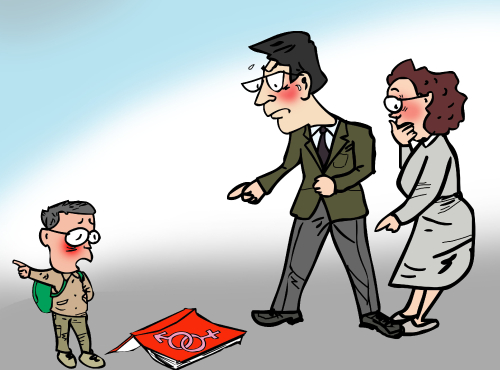 |
|
(LI SHIGONG) |
Primary schools in Wuhan, central China's Hubei Province, started to use a new sex education textbook in September. The textbook has detailed information on females' physiological structure and the changes they go through during puberty. It also features illustrations of females' reproductive organs and the process of menstruation. Parents and even most teachers say sex education in this form is not suitable for primary school students.
Although it is already in use, public debate continues to rage on. Some blame a conservative attitude toward sex education for the widespread lack of understanding on the topic among China's youth. Many of those with this view also blame the lack of knowledge, at least in part, for the tragic cases over the past year where school-age girls were found to have been the victims of abuse. Insufficient sex education may even further trigger students' curiosity and they may risk "eating the forbidden fruit" and doing so without taking necessary precautions.
Some others, however, believe that sex education should be more discreet, so as not to encourage students to become too interested in sex.
Demystifying sex
Si Hanhan (www.gmw.cn): Sex education still lags behind our children's development levels. Traditional textbooks do not divulge much on these topics and, as a result, they can make sex seem even more mysterious. Without a formal textbook, teachers don't know how to talk to and educate their students about their physical development. Students learn about their bodies from sources they find themselves, which include uniformed gossip and rumors from their peers that at worst may end up being pornographic in nature and grossly misleading. This leads to a large amount of confusion and misunderstanding for the country's youth.
Honest and candid sex education as in this textbook indicates some extent of progress in the understanding of and attitude toward sex by the whole of society. In recent years, more than one incident of teachers taking advantage of their students has been reported. In some cases, the victims did not know how to protect themselves.
If we educate our students about their reproductive organs through diagrams and discussions, then their sexual health during puberty will be safeguarded. In addition, they will also understand the origin of life and their own process of growth and development. Their bewilderment and curiosity about puberty and sex can be resolved.
Chen Qianxuan (www.cnhubei.com): Recent years have seen an increasing number of children becoming the victims of abuse. Exposed cases by the media are suspected of being only the tip of the iceberg.
Education on sex safety is now on the agenda in primary schools. The problem is how to achieve safety. Influenced by our traditional culture, most Chinese are conservative when it comes to the topic of sex. When they received the textbooks, teachers in Wuhan's primary schools were shocked at first. As for pupils, many girls were embarrassed and unwilling to participate in the lessons. Obviously, the students felt that "sex" was mysterious. However, the teachers must realize their obligation to their pupils. Parents are also obligated to teach their children to ensure they are safe and not confused.
In China, when a child asks "where I am from," their parents tend to tell them that they were picked up along a river or in a park. Parents and teachers need to be honest about the origin of life and put aside their own embarrassment for the sake of our children.
| 